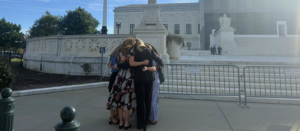Concerned Women for America (CWA) met with Irish pro-life activists to discuss advancing the cause for the sanctity of life. It was Saint Patrick’s Day, and our new friends from Northern Ireland and the Republic of Ireland were visiting the United States as they have done for the last decade.
We learned about their ongoing endeavors to promote Biblical values, especially protections for the unborn. They explained their efforts to bring back a culture of life.
In the Republic, a 2018 referendum stripped an essential constitutional protection for the unborn. The Health (Regulation of Termination of Pregnancy) Act became law following the constitutional repeal. Under the Act, abortion is permitted “in cases where there is a risk to the life, or of serious harm to the health, of the pregnant woman; where there is a condition present which is likely to lead to the death of the foetus either before or within 28 days of birth; and without restriction up to 12 weeks of pregnancy.”
The Act took effect on January 1, 2019. As you may appreciate, the drastic rollback is more protective than any federal laws in the United States. Even still, in the first year the Act was in effect, there were over 6,000 abortions. This was and continues to be a tragic loss of life, as well as a significant setback for our Irish friends. They recounted how the Catholic Church in the Republic failed to provide the necessary support, as it was hesitant to anger certain groups. But our friends have not given up hope in the Republic. They discussed, in particular, their focus on sharing pro-life ideals with university students. And some safeguards still exist, such as a three-day waiting period before proceeding with an abortion.
In Northern Ireland, residents experience the most conservative body within the United Kingdom. Moreover, the Catholic Church is actively involved in the pro-life cause. But the conservative-leaning authorities constantly struggle with being part of the United Kingdom and ultimately subject to the liberal Parliament of the United Kingdom. Pro-life politicians such as Paul Given (a member of the Northern Ireland Parliament and former First Minister) and Jonathan Buckley (also in the Northern Ireland Parliament), both from the Democratic Unionist Party (which would be what we consider a conservative party), continue to fight for the protection of unborn children.
The Republic’s repeal of the constitutional protection for the unborn and Northern Ireland’s trials with the U.K., despite the setbacks, offer some lessons. One big takeaway is the power of messaging. The pro-abortion movement in Ireland used the safe-legal-rare canard familiar to the American pro-life experience. Much like in America, while they focused on tragic and (fortunately) uncommon cases like rape and incest, they also supported abortion for any reason.
Another lesson we can learn is the importance of staying true to our values despite opposition. Irish pro-life advocates faced a lot of criticism and derision for their beliefs, particularly from those who saw the Catholic Church as being behind the movement. However, they persevered, and their dedication to protecting the unborn continues to make a difference.
These issues are not just local—they are global. Hearing from the Irish perspective helps us in our own fight for life. Despite the challenges we face, we must remain steadfast in our commitment to protecting the unborn in America and around the world.
Please pray for their initiatives to help pregnant mothers in need, to help post-abortive men and women, and to turn Ireland pro-life again!






